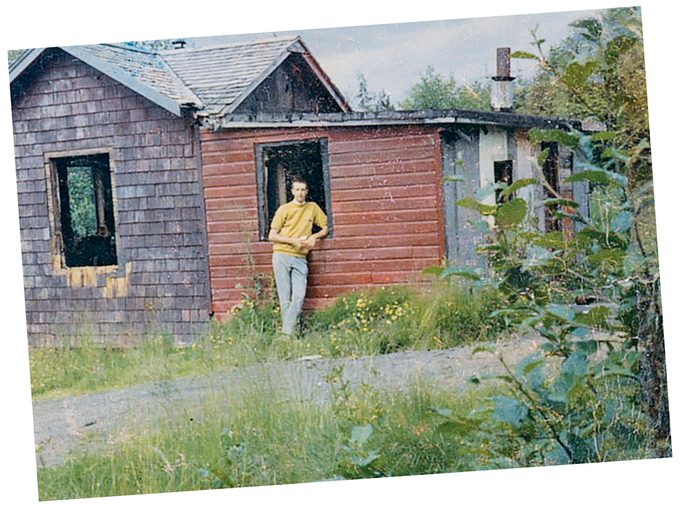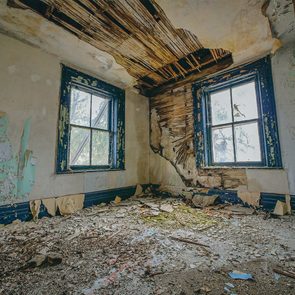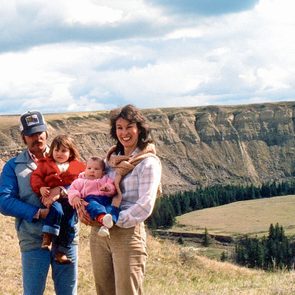The Hermit of Port Edward
Remembering an unlikely and brief friendship one long-ago summer.
Near the end of my first summer away from home, I went with my older brother to visit a man who might have a place to rent. He was a sort of hermit, we had been told, and lived in the woods near Port Edward, B.C., south of Prince Rupert. My brother and I were working at the pulp mill and had been living in a trailer in Port Edward for the summer, but the owners had just returned from a long sailing trip, so we had to find other accommodations.
The first sight of our prospective landlord gave us a shock. He emerged from his weathered little cabin as if he had been roused from sleep, though it was midday. Stubble-faced, shirtless, with a pink stump where his right arm should be and a long white scar tracing a crescent across his massive belly, he greeted us affably enough.
We tried to ignore the stains of egg yolks, grease and who knows what else on his shabby trousers and accepted his invitation to look around.
The little shack had four rooms: two bedrooms with a woodstove in each, a tiny porch where firewood was stored and a dog lived, and a tiny washroom. Both bedrooms were cluttered and filthy, but at least the hovel had running water and inside plumbing. The windows were covered with plastic and each bedroom had a sagging bed, a couple of shelves, a table and two chairs.
“There’s lots of scrap wood lyin’ around that you can burn, and you can borrow my wheelbarrow,” the man said, gesturing with his good arm. “It’s not much of a place, but you can have it for 50 bucks for two weeks.”
My brother and I looked at each other, then nodded. The price was right and soon we’d be back in the Fraser Valley.
So we moved in, uneasy about the prospect of sharing a house with this sloppy old hermit, but intrigued by the challenge. Cleaning our bedroom was a daunting task, but after we had tossed out the refuse of the previous tenant, lined the shelves with newspapers, stored our few belongings and lit a fire, it started to feel like home.
Tea and Comfort
Our landlord’s name was Romeo Davignon, we learned, but he kept pretty much to himself until my brother left to return to the University of B.C. During the 10 days or so that I remained in the cabin, Romeo began to seek out my companionship.
“When you get back from work tomorrow, why don’t you join me for a cuppa tea?” he suggested. So I did.
I had worked the graveyard shift at the pulp mill and after walking about a mile to the little cabin in the woods, I was ready for a cup of tea.
When Romeo invited me into his part of the cabin, I couldn’t help noticing how soiled his bedsheets were. Romeo put an old black kettle on the stove and set out two cups, one of them chipped. While the water boiled, he sliced a loaf of bread. I watched, fascinated, as he pinned the loaf to the cutting board with the stump of his right arm, then sliced it using his left hand.
Despite the squalid surroundings and my host’s slovenly appearance, the tea tasted fine, and so did the toast and jam. Romeo was a laconic man, but glimpses of his life emerged as I had tea with him almost every day during my short stay in his cabin. He was a former boxer from Montreal who had lost his arm in a railway accident, I learned. A friend sometimes took him deer hunting—how proud he was of being able to pull the trigger with his left hand while pressing the rifle against a tree with his stump of an arm. Sometimes he supplemented his pension by selling postcards on the streets of Prince Rupert, he confided.
Once he proudly showed me how he had rigged up a series of pipes to provide hot water from the heat of the woodstoves. It was an impressive feat of plumbing and I was quick to say so; how he managed it with one hand was beyond me.
Romeo smoked incessantly, rolling his own with the aid of a little device, and I was afraid he’d burn the place down, but the cabin was always there when I returned from work.
Simple as it was, it was a cosy little haven, especially when I walked through the dark woods after midnight at the end of an afternoon shift. There was no lock on the door, but my possessions were never disturbed and I felt quite safe there, warmed by the stove, hearing the relentless Prince Rupert rain drum against the tin roof and the wind buckle the plastic windows. I read letters from home by the light of a single bulb that swung from a long cord above my bed.
One evening, Romeo had visitors, a girl of about nine and her brother, probably a couple of years older. I remember the girl had beautiful long hair and big, dark eyes; she let her brother do most of the talking but she seemed fascinated by Romeo. I never did learn what had prompted them to visit the lonely old man or if they were related to him in some way.
On my last night there, I lay on my bed reading all the letters I’d received from family members and friends during the summer. I was 900 miles away from home and the letters made me feel nostalgic, but I burned all the letters in the woodstove as I’d soon be seeing these people again in person.

Without a Trace
As for Romeo, I never met him again, nor did I try to keep in touch. Three summers later, I worked as a porter on the Canadian National Railway. On a weekend layover in Prince Rupert, my friend Al and I walked all the way from Prince Rupert along the railway tracks to Port Edward, then up the hill into the woods.
How surprised Romeo would be when I dropped in, I thought, but when I got to the cabin, it was gutted and bare. The outside was as I’d remembered it—red siding on “my” side, cedar shakes on his—but the interior had been charred by fire.
Had his constant smoking caused the fire, I wondered, and where was he now?
This was all more than 50 years ago, but once in awhile, when it’s rainy or windy, I’m transported to that little shack in the woods, watching Romeo pin the loaf of bread to the cutting board with his stump and handing me a hot cup of tea in a chipped mug as he asked, “So how was your shift today?”
Next, take a look in at Bradian, B.C.’s most famous ghost town.






